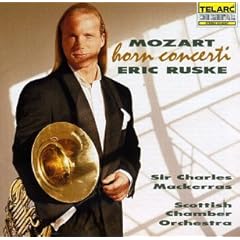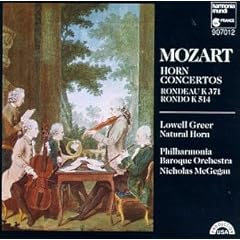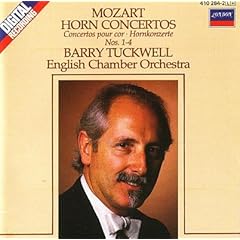Mozart's Horn Concerti
Posted by: Tam on 05 March 2008

I bought this disc a little by accident. A week or two ago I acquired Mackerras's new recording of Mozart's final four symphonies with the SCO (which, though not the subject of this thread, is absolutely superb). However, I've been a little annoyed by the fact that almost no review bothered to make serious comparison to his earlier Prague recordings (which formed a complete cycle). Then, the weekend before last, on Radio 3's CD Review, Andrew McGregor informed us that Mackerras was recording some of these works for the 3rd time, earlier recordings I was unaware of (and which, when they arrive, may form part of a thread along with the new ones and the Prague ones). However, while searching Amazon for all things Mozart and Mackerras, I came across these horn concerti, of which I was already dimly aware and took the punt.
I knew nothing of Ruske and so, perhaps unusually for a concerto recording, I was buying on the strength of conductor and orchestra (who have shown their Mozart pedigree time and again in their series of opera recordings and their piano concertos with Brendel). I am glad I did. On the basis of this evening's first listen this is one of the finest recordings I've heard and seems likely to be one that gets played a great deal in the future.
As one would expect, the SCO are on fine form under Mackerras, exemplary, one might say. One of his many talents is that he is a very sensitive accompanist and while the orchestral playing is beautiful and sparkles throughout Mackerras never dominates his soloist. Speeds are brisk, but never feel rushed.
But what of Ruske? An American who rose to principal horn of the excellent Cleveland Orchestra at the age of 20 and of whom I'd never before heard. I'm moved to question why not. His phrasing is superb and he gets a lovely tone.
The recordings I own for comparison are the Orpheus Chamber Orchestra (where solo duties are divided between orchestra members William Purvis and David Jolley), Civil with Klemperer and the Philharmonia, and Ab Koster with Burno Weil and Tafelmusik (the later being a period instrument/nature horn effort). The period effort, while being the first recording I owned, is actually the one I play least - I prefer these on modern instruments, and Mackerras is much better accompanist than Weil.
The Orpheus (and interesting group in that they play without a conductor) are much finer - taut playing, somewhat clipped phrasing, but tones and colours not as impressive as Mackerras coaxes from the SCO and they do not match his skill as an accompanist. Similarly the soloists, though creditably are not on a par with Ruske, more notes come closer to being fluffed.
So, to Civil (and the kind gift that this set was from George). He was one of the finest horn players of his generation (or, indeed any) alongside Barry Tuckwell (for your trivia question, what was probably the only occasion they performed together in the same orchestra? the answer links to another name in this post). His phrasing and the quality of his playing is simply superb. Klemperer is a fine accompanist and the Philharmonia under feel surprisingly lightweight none of the weight and (George may disagree with me here) stodginess one might have expected from his studio Beethoven recordings of the same period. Between Ruske and Civil, the latter is probably the finer player, but I think Mackerras and the SCO provide a more engaging support.
Ruske and Mackerras have one final advantage and a curiosity. As with many recordings they include the Rondo K371 but there is also the fragment K494a (which like all such fragments ends disappointingly mid-flow). The gem is a full orchestration of Flanders and Swann's magnificent Ill Wind (set to the rondo finale of K495 "I once had a whim which I had to obey...." and so on). Mackerras, with his G&S pedigree plays this just right and Richard Stuart sings were. A must for Flanders and Swann fans too, then.
Alongside Civil, this is one to return to again and again (my preference is just for the slightly more vital reading of Ruske and Mackerras, but I wouldn't want to be without either, the quality of the Telarc recording is probably better than EMI's effort for Civil, which is slightly harsh).
regards, Tam
p.s. Talk about unintended listening, here is some unintended posting (must go and have dinner now).


